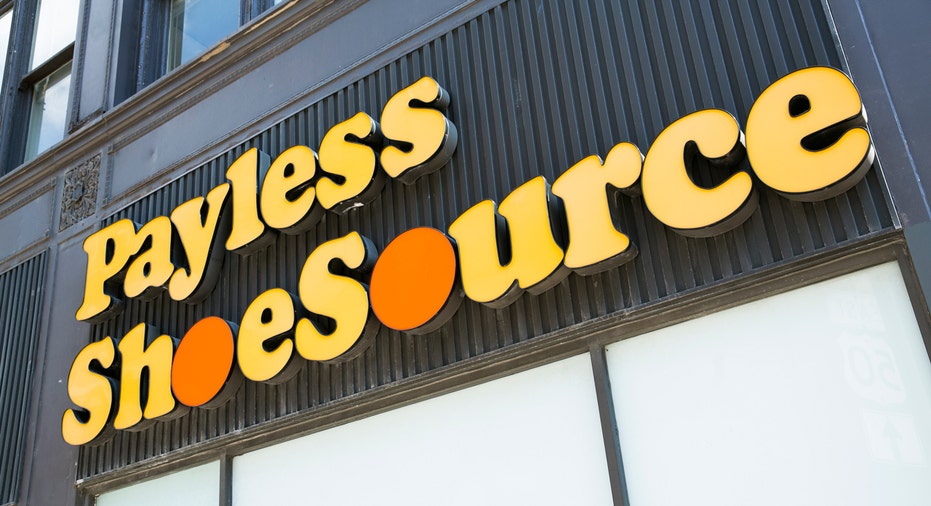Payless emerges as rare bankruptcy survivor in tough retail landscape

CHICAGO – Payless ShoeSource is set to emerge from bankruptcy as soon as Wednesday, one of the largest retail chains to do so, and is banking on a strategy focused primarily on bricks-and-mortar sales at a time when e-commerce is casting an ever-growing footprint on retail sales.
Payless' emergence essentially gives the company a do-over after disposing of half of $847 million of debt it had built up under its private-equity ownership.
With a cleaned-up balance sheet, Payless is seeking to position itself to compete in a tight U.S. market, open more stores across Latin America - a major part of its growth strategy - and develop new franchises in Asia. The company did not respond to requests for comment on whether its chief executive, Paul Jones, will stay on board to lead the turnaround effort.
Payless' focus on bricks and mortar comes in a year of record U.S. store closings and a string of bankruptcies among retail brands, including The Limited, hhgregg, RadioShack and Gymboree. But it also occurs just weeks after Amazon.com <AMZN.O> announced plans to purchase Whole Foods Market Inc <WFM.O>, a move that has prompted some retailers and analysts to take fresh looks at how conventional retailing can co-exist in the face of e-commerce competition.
Payless has closed roughly 700 mostly mall-based U.S. stores in bankruptcy, court papers show, but is opening four mega stores here to add to some 3,200 post-bankruptcy locations in the U.S. and abroad. It plans to invest $234 million over five years, including on systems that will adjust inventory quickly in response to customer demand and improve its competitiveness on line, according to court filings and interviews with company representatives.
But for now, the company believes a strategy heavy on in-store sales can withstand the onslaught of e-commerce. Payless does not disclose what percent of sales it gets online. Designer-brand retailer DSW Inc <DSW.N> last year brought in nearly 16 percent of its revenue online, and Caleres Inc, parent of discounter Famous Footwear and other brands, brought in 5.2 percent of its sales online, according to research firm eMarketer.
The Payless model is built on core loyal customers: budget-conscious mothers who still flock to stores with their children to find a perfect fit for under $30 during four key selling seasons, including Easter dress shoes, summer sandals, back-to-school, and winter boots, court papers show.
"There's an extremely loyal Payless customer, who is basically a mother, who knows she can go into a store at any time and find a quality product at a reasonable price," said Payless' lead restructuring lawyer, Nicole Greenbelt of Kirkland & Ellis.
The emergence from bankruptcy gives Payless a relatively clean balance sheet and better terms on leases and vendor contracts worldwide.
Retail restructuring expert Christopher Jarvinen of law firm Berger Singerman said the company has a business plan with a future. "It's the antithesis of what we've seen in other retail bankruptcies," he said.
Landlords reduced rent by an average 30 percent to 50 percent and vendors extended trade credit by 60 to 75 days, according to sources with knowledge of the matter who declined to be named because the individual contracts are confidential.
The company's Latin America operation potentially can provide cash flow to give Payless room for error. Latin America contributed nearly 40 percent of the company's $95 million in EBITDA in 2016, even though it accounts for less than 10 percent of its global store footprint, and sales in the region are growing.
Payless, with 400 stores in the region, this year plans to add 22 locations across Peru, the Dominican Republic, Costa Rica, Honduras, and Nicaragua. It plans to open more stores and enter new Latin American countries in 2018, a spokeswoman said.
Still, skeptics say its future is challenging.
"My major concern is whether Latin America can really cover any unforeseen decline in margins in the U.S," said consultancy Michel-Shaked Group's managing director Israel Shaked, who was hired by the official unsecured creditors' committee to analyze the company's accounts.
The company's troubled past and the competitive retail environment still will leave little wiggle room for negative surprises, turnaround specialists said.
While Payless has halved its debt during bankruptcy, $280 million of new term loans carry yields between 7 percent and 9 percent, broadly in line with other distressed retailers but above average term loan yields of 3.6 percent, according to Thomson Reuters LPC data.
Payless must find a way to differentiate itself from Wal-Mart Stores Inc <WMT.N>, Target Corp <TGT.N> and Kohls Corp <KSS.N>, all of which also operate in the under $30 footwear category.
"There aren't that many other specialty shoe stores, but there are dozens of other retail chains that sell shoes, and they have taken much of that business a little at a time," said John Yozzo, managing director of FTI Consulting.
(Reporting by Tracy Rucinski; additional reporting by Jessica DiNapoli and Nandita Bose; Editing by Noeleen Walder, David Griesing and Nick Zieminski)



















